Synopsis
As its foreword, the book features a poem by Jimmie Durham. The preface is by Winona LaDuke and poems from John Trudell's Living in Reality appear as preludes to each section. Russell Means' 1982 platform for president of the Oglala people is included as an appendix. Maps of Indian land claims/treaty areas are included. The book is dedicated "for my mother."
The collected essays, mostly previously published, provide a history of Native American struggle for decolonization provided through the examples of the Haudenosaunee in upstate New York, the Lakotas on the northern Plains, the Lubicon Cree in northern Alberta, and the Navajo and Newe (Western Shoshone) in the upper Sonoran. The case is made that uranium mining, coal stripping, hydropower generation, and water diversion are ecocidal as well as genocidal, and that the ecological damage poses a threat to all North Americans.
Churchill also discusses the Native North American diaspora caused by their displacement.
- "Not only the people of the land are being destroyed, but, more and more, the land itself. The nature of native resistance to the continued onslaught of the invading industrial culture is shaped accordingly. It is a resistance forged in the crucible of a struggle for survival." —from the introduction
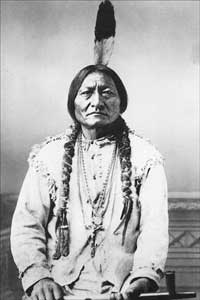
The Lakota are a Native American people. Also known as the Teton Sioux, they are one of the three prominent subcultures of the Sioux people, with the Eastern Dakota (Santee) and Western Dakota (Wičhíyena). Their current lands are in North and South Dakota. They speak Lakȟótiyapi—the Lakota language, the westernmost of three closely related languages that belong to the Siouan language family.
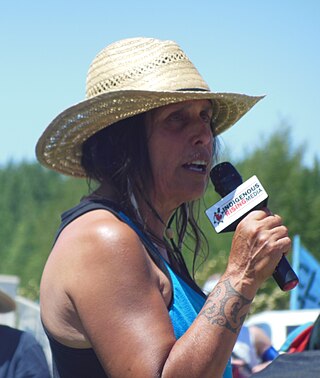
Winona LaDuke is an American environmentalist, writer, and industrial hemp grower, known for her work on tribal land claims and preservation, as well as sustainable development.

The American Indian Wars, also known as the American Frontier Wars, and the Indian Wars, was a conflict initially fought by European colonial empires, the United States, and briefly the Confederate States of America and Republic of Texas against various American Indian tribes in North America. These conflicts occurred from the time of the earliest colonial settlements in the 17th century until the end of the 19th century. The various wars resulted from a wide variety of factors, the most common being the desire of settlers and governments for Indian tribes' lands. The European powers and their colonies enlisted allied Indian tribes to help them conduct warfare against each other's colonial settlements. After the American Revolution, many conflicts were local to specific states or regions and frequently involved disputes over land use; some entailed cycles of violent reprisal.

The American Indian Movement (AIM) is an American Indian grassroots movement which was founded in Minneapolis, Minnesota in July 1968, initially centered in urban areas in order to address systemic issues of poverty, discrimination, and police brutality against American Indians. AIM soon widened its focus from urban issues to many Indigenous Tribal issues that American Indian groups have faced due to settler colonialism in the Americas. These issues have included treaty rights, high rates of unemployment, the lack of American Indian subjects in education, and the preservation of Indigenous cultures.

An American Indian reservation is an area of land held and governed by a U.S. federal government-recognized Native American tribal nation, whose government is autonomous, subject to regulations passed by the United States Congress and administered by the United States Bureau of Indian Affairs, and not to the U.S. state government in which it is located. Some of the country's 574 federally recognized tribes govern more than one of the 326 Indian reservations in the United States, while some share reservations, and others have no reservation at all. Historical piecemeal land allocations under the Dawes Act facilitated sales to non–Native Americans, resulting in some reservations becoming severely fragmented, with pieces of tribal and privately held land being treated as separate enclaves. This intersection of private and public real estate creates significant administrative, political, and legal difficulties.

Russell Charles Means [wə̃blɪ ohitika] was an Oglala Lakota activist for the rights of Native Americans, libertarian political activist, actor, musician and writer. He became a prominent member of the American Indian Movement (AIM) after joining the organization in 1968 and helped organize notable events that attracted national and international media coverage.

Charmaine White Face, or Zumila Wobaga, is an Oglala Tetuwan from the Oceti Sakowin in North America.

The Institute of American Indian Arts (IAIA) is a public tribal land-grant college in Santa Fe, New Mexico, United States. The college focuses on Native American art. It operates the Museum of Contemporary Native Arts (MoCNA), which is housed in the historic Santa Fe Federal Building, a landmark Pueblo Revival building listed on the National Register of Historic Places as Federal Building. The museum houses the National Collection of Contemporary Indian Art, with more than 7,000 items.

Ward LeRoy Churchill is an American activist and author. He was a professor of ethnic studies at the University of Colorado Boulder from 1990 until 2007. Much of Churchill's work focuses on the historical treatment of political dissenters and Native Americans by the United States government, and he expresses controversial views in a direct, often confrontational style. While Churchill has claimed Native American ancestry, genealogical research has failed to unearth such ancestry and he is not a member of a tribe.
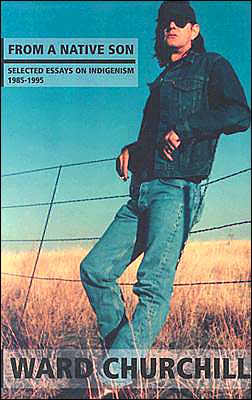
From a Native Son: Selected Essays on Indigenism, 1985–1995 is a 1996 book by Ward Churchill. It is a collection of 23 previously published essays on various topics relevant to the indigenous peoples of the Americas in relation to their experience of being colonized. It is introduced by Howard Zinn.

The Oglala are one of the seven subtribes of the Lakota people who, along with the Dakota, make up the Očhéthi Šakówiŋ. A majority of the Oglala live on the Pine Ridge Indian Reservation in South Dakota, the eighth-largest Native American reservation in the United States.
JoAnn Tall is an environmental activist of the Oglala Lakota tribe who has worked to ensure the people have a chance to approve major projects for energy development. She was awarded the Goldman Environmental Prize in 1993 for her protests against uranium mining and plans for testing nuclear weapons in the Black Hills area, near the Pine Ridge Indian Reservation where she lives.
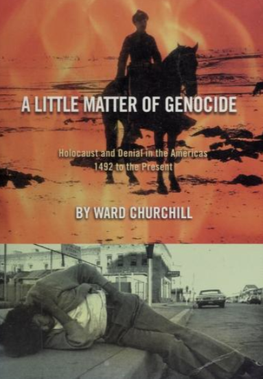
A Little Matter of Genocide: Holocaust and Denial in the Americas 1492 to the Present (1997) is a book which was written by Ward Churchill. A Little Matter of Genocide surveys ethnic cleansing from 1492 to the present. Churchill compares the treatment of North American Indians to historical instances of genocide by communists in Cambodia, Turks against Armenians, and Europeans against the Gypsies, as well as Nazis against the Poles and Jews.
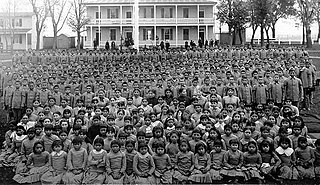
Both during and after the colonial era in American history, white settlers engaged in prolonged conflicts with Native Americans in the United States, seeking to displace them and seize their lands, resulting in American enslavement and forced assimilation into settler culture. The 19th century witnessed a surge in efforts to forcibly remove certain Native American nations, while those who remained faced systemic racism at the hands of the federal government. Ideologies like Manifest destiny justified the violent expansion westward, leading to the passage of the Indian Removal Act of 1830 and armed clashes.













